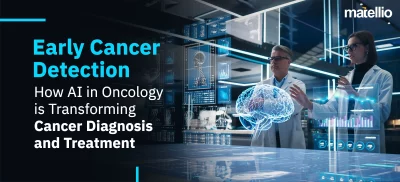
If you’re running a business and still using your ERP system the same way you did in 2012, you’re leaving money on the table. Most ERP systems are great at storing data, tracking orders, and keeping things organized. But they’re not built to spot trends, make predictions, or help you decide what to do next. And that’s where AI in ERP systems comes in!
Think of AI in ERP as an upgrade that turns your ERP from a reporting tool into a real-time decision-making machine. It learns from patterns in your inventory, sales, staffing, supply chain, and customer behavior—then helps you act before problems show up.
This isn’t future tech. It’s already working in real businesses. In fact, the global AI in ERP market is projected to surge from $4.5 billion in 2023 to $46.5 billion by 2033, reflecting a robust CAGR of 26.30%
In this blog, we’ll show:
- What AI-powered ERP actually looks like in practice
- AI use cases in ERP that directly improve margins, reduce waste, and cut manual work
- Examples of how generative AI in ERP is reshaping forecasting, inventory, and customer service
- And how Matellio helps businesses like yours build, scale, and integrate it—without disrupting what’s already working
Let’s talk about what your ERP system should really be doing for your business.
What Is an ERP System, and Why AI in ERP
Most businesses use ERP software to manage day-to-day operations like inventory, finance, HR, and customer service. A traditional ERP system helps centralize data, so your teams aren’t working off different spreadsheets or outdated systems.
But here’s the thing—ERP software without AI is just a storage system. It tells you what happened, but not what to do next. That’s why more companies are moving toward AI in ERP software—because they want systems that think, not just record.

A modern AI-powered ERP helps different departments share real-time data, automate routine tasks, and use that data to make smarter, faster decisions. From forecasting stock needs to identifying customer trends, it shifts your ERP from a static tool to an active decision partner.
And with today’s advanced AI integration services, your ERP doesn’t have to be replaced to make this happen. You can add AI to what you already use—upgrading it to a smarter system that fits your operations.
Whether you’re in retail, construction, education, or real estate, ERP systems are essential. But if you’re not using AI in ERP systems, you’re leaving insights—and revenue—on the table.
AI in ERP Systems: Built for Every Industry
One of the biggest misconceptions about AI in ERP systems is that it’s only for big corporations or tech-heavy businesses. That’s not true.
With today’s tools and flexible AI services, almost every industry can adopt AI-powered ERP to simplify operations, cut costs, and make faster decisions. Whether you’re in education, retail, construction, or real estate, there’s a tailored AI in ERP software solution that can work for your specific processes and goals.
Let’s break it down:
AI in ERP for Education
AI-powered education ERP software development services help schools, universities, and training institutes simplify and centralize operations. From student data to exams, everything is handled from one smart system.
Key Capabilities:
- Automate admissions and fee processing
- Predict dropout risk based on engagement
- Enable smart scheduling and resource allocation
- Offer chatbot-based student support
AI in ERP for Real Estate
Real estate firms juggle property listings, tenant management, maintenance, and compliance. AI-powered ERP helps keep it all in sync, while offering valuable forecasting insights.
Key Capabilities:
- Predict occupancy trends
- Automate maintenance workflows
- Flag late payments or lease risks
- Analyze market data for better pricing
Learn how Real estate ERP software development fits your model
AI in ERP for Retail
Retail moves fast—inventory, sales trends, customer preferences all shift daily. AI-powered retail ERP software solutions offer real-time decision-making to the floor and back office.
Key Capabilities:
- Forecast demand and stock needs
- Personalize promotions by customer behavior
- Automate returns and logistics
- Spot shrinkage and theft patterns early
AI in ERP for Construction
Construction companies need to balance resources, timelines, and compliance every day. Generative AI in ERP gives you better control and fewer surprises.
Key Capabilities:
- Predict project overruns and delays
- Optimize equipment and material usage
- Automate compliance and safety checks
- Enable real-time job site reporting
Get insights into our Construction ERP software
With the right AI use cases in ERP, you’re not just getting efficiency—you’re building smarter processes that evolve with your business. And when you choose Matellio, we don’t just develop software—we deliver ML model development services, integrations, and full-stack ERP intelligence that’s made for your industry.
Implement AI in Your ERP System with Expert Assistance! Schedule Your Free 30-minute Consultation Today. When we talk about AI in ERP systems, we’re not talking about vague “automation” or future hypotheticals. We’re talking about real tools companies are using today to solve real problems—across every industry. Here are the most widely adopted and proven AI use cases in ERP, built to work across education, retail, construction, real estate, and beyond: One of the biggest challenges in retail ERP software solutions and manufacturing? Stocking the right amount at the right time. Traditional forecasting methods can’t keep up with real-world shifts—like weather, supply chain issues, or shifting buyer behavior. AI-powered ERP systems analyze historical data, market trends, and even external factors to predict future demand more accurately. Inventory isn’t just about counting what’s on the shelf. It’s about knowing when to reorder, how much to keep on hand, and where to put it. With AI in ERP software, inventory is monitored in real-time and managed based on predictive logic. AI sets reorder thresholds, adjusts safety stock, and even automates purchase orders—based on demand, vendor lead times, and sales velocity. Forget spreadsheets. In finance-heavy operations like construction ERP software or real estate ERP software development, AI does the heavy lifting. AI scans past transactions, budgets, and market data to predict future expenses, revenue flow, and risk. It also handles reconciliation by matching entries, detecting duplicates, and flagging irregularities. Whether you’re running a retail store or a service-based enterprise, your customers are already giving you signals. Most ERP systems don’t know what to do with them. Generative AI in ERP identifies patterns in customer behavior, buying cycles, and support interactions. It recommends cross-sells, predicts churn risk, and enables personalized outreach—directly from the ERP. In manufacturing and project-based businesses, aligning people, equipment, and timelines is always a balancing act. With AI in ERP, you can automatically schedule production runs based on real-time demand, material availability, and workforce constraints. AI even adapts the schedule when delays or issues are detected. Managing suppliers manually wastes hours—and creates mistakes. With AI in ERP systems, invoices can be auto-generated, payment terms tracked, and vendors evaluated based on performance data. AI suggests which vendors to use, when to order, and even helps negotiate better terms based on historical data. Most ERPs show you dashboards. But AI-powered ERP platforms tell you what’s wrong and what to do about it. With real-time analytics and AI-based alerts, business owners get insights—not just reports. From detecting revenue dips to forecasting cash shortages, AI gives you a heads-up before things become a problem. These use cases aren’t futuristic—they’re already being implemented by companies that want their AI in ERP systems to work smarter, not harder. And with Matellio, you can plug these capabilities directly into your ERP. Contact us today! If you’re still on the fence about integrating AI into your ERP system, consider this: businesses that have adopted AI-powered ERP solutions are already reaping significant benefits. From improved operational efficiency to substantial cost savings, the data speaks volumes. Integrating AI into your ERP system isn’t just a technological upgrade—it’s a strategic move that can lead to significant improvements in efficiency, cost savings, and overall business performance. As the data shows, companies that have embraced AI-powered ERP solutions are already ahead of the curve. Don’t let your business fall behind; consider how AI integration can propel your operations forward. Ready to Begin? Share Your Requirements with Us to Get Started with a Free 30-minute Consultation! If you’re looking to implement AI in ERP systems, you don’t need a vendor. You need a partner who knows how to connect business goals to real tech outcomes. That’s what we do at Matellio. We build AI-driven ERP platforms that are tailored to your workflows—not someone else’s template. From custom dashboards to predictive models, we turn standard ERP into a system that thinks, learns, and helps you move faster. Here’s what makes us different: We design and deliver full-scale AI-powered ERP solutions for real-world use. Whether you need smart forecasting, process automation, or behavior-based insights—we build it to fit your model. We’ve developed ERP platforms across industries—education, retail, real estate, and construction. Thanks to our custom product development services, we tailor AI-based ERP software to fit what your users actually do every day. Our team doesn’t stop at ERP features. We integrate AI for smarter data handling and ML model development services to drive predictions, alerts, and automation directly inside your platform. Do you already have an ERP system in place? We’ll integrate generative AI in ERP, without disrupting what’s working. We make AI work with your systems—not around them. We don’t just install software. We deliver future-ready, flexible, and scalable AI in ERP software that gives you a clear advantage—faster decisions, cleaner data, less manual work, and better visibility across your business. Let’s build your AI roadmap together. Book your free 30-min consultation and let’s talk about where AI can make a real difference. AI Use Cases in ERP: Real Applications Businesses Are Using Today
Use Case
What AI Does
Demand Forecasting
Predicts future demand based on real-time trends
Smart Inventory Management
Automates stock levels, reordering, and restocking
Financial Forecasting & Reconciliation
Detects anomalies, automates closing, improves budgeting
Customer Insights & Sales Prediction
Recommends offers, flags churn, personalizes outreach
Production & Scheduling
Aligns operations with demand and resource availability
Invoicing & Procurement
Auto-processes invoices, matches vendors, cuts delays
Real-Time Reporting & Alerts
Highlights risks, offers next steps, updates live
Demand Forecasting That Actually Hits the Mark
Smart Inventory That Runs on Its Own
Financial Forecasting and Auto-Reconciliation
Customer Insights and Predictive Sales
Smarter Production and Operations Scheduling
Automated Invoicing, Procurement, and Vendor Matching
Real-Time Dashboards With AI-Powered Alerts
The Numbers Don’t Lie—AI in ERP Systems Is Delivering Real Results

The Bottom Line:
Why Matellio for AI in ERP Systems
Real Expertise in AI-Powered ERP
Industry-Focused ERP Development
Built-In Intelligence, Not Just Software
Seamless AI Integration Services


